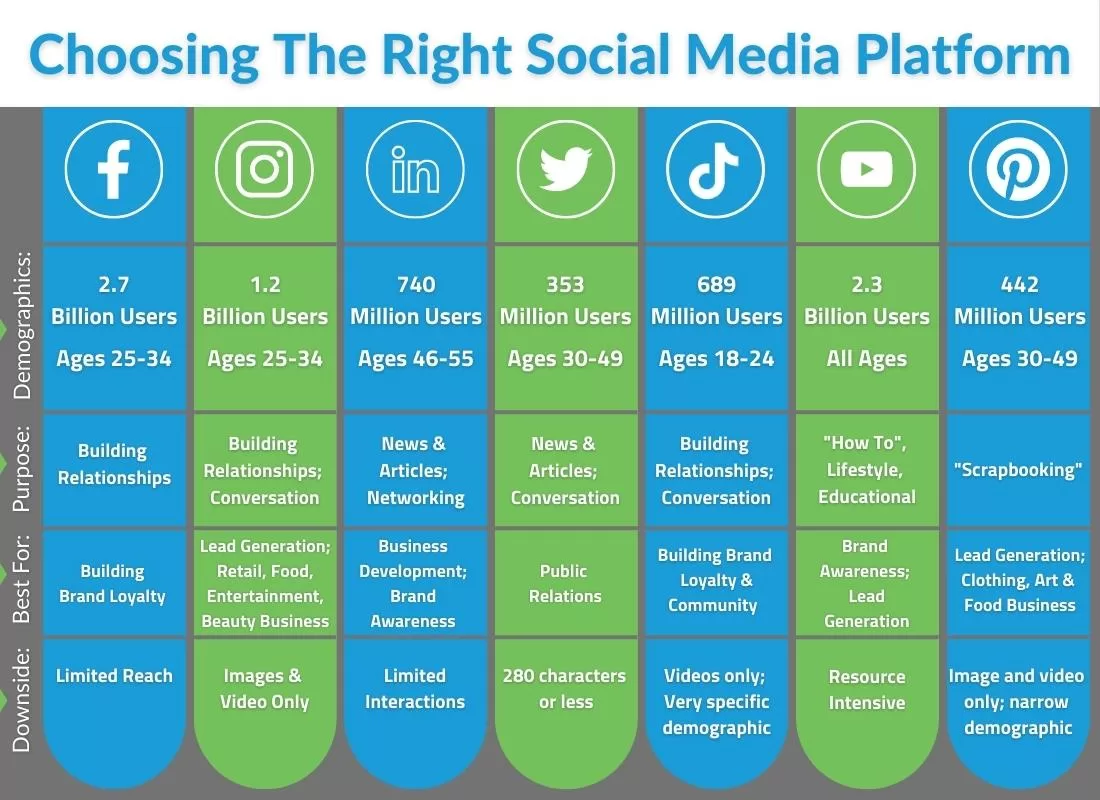In today’s digital age, social media has become an indispensable tool for businesses of all sizes. With billions of active users worldwide, these platforms offer unmatched opportunities to connect with your target audience, boost brand visibility, and drive business growth. However, not all social media platforms are created equal, and it’s crucial to choose the ones that align with your business objectives and resonate with your target market in order to see the greatest success.
That’s why in this blog, we’re here to guide you through the process of selecting the right social media platforms for your business. Save our cheat sheet below and follow along, as these tips will help you make a powerful entry into the world of social media marketing.

1. Understand Your Audience
The first step in figuring out the optimal social media platform for your business is to gain a deep understanding of your target audience. Who are they? What are their demographics, interests, online behaviors, etc.?
Conduct thorough market research, analyze customer data, and leverage insights from your existing customer base to identify the platforms where your audience is most active. This knowledge will help lay the foundation for your social media strategy.
2. Set Clear Objectives
In order to effectively choose the right social media platforms, you’ll first need to define your business objectives. Are you looking to increase brand awareness, generate leads, drive website traffic, or foster customer engagement?
Each social media platform offers unique features and benefits, and aligning your objectives with the platform’s strengths will maximize your chances of success. Prioritize your goals and choose the platforms that can help you achieve them.
3. Assess Platform Relevance
Not all social media platforms are “suitable” for every business. Consider the nature of your products or services and assess how well they align with each platform.
For example, if you run a visual-centric business (restaurant, general contractor, flower shop, etc.), you may want to consider using Instagram, TikTok, and Pinterest to promote your business, since these platforms prioritize visual content.
If your business happens to thrive on professional networking (manufacturing company, franchisor, etc.), then you’ll want to consider LinkedIn and Twitter.
Lastly, we recommend Facebook for all types of businesses, as this platform caters to a wide range of industries, offering a wide reach, SEO benefits, and diverse targeting options.
4. Analyze Platform Features
Each social media platform has its own set of features, functionalities, and user behaviors. It is up to you, the marketer, to dive deep in the unique characteristics of each platform to determine how well they can serve your business’s goals.
For instance, if video content is a vital part of your marketing strategy, you’ll want to leverage YouTube, TikTok, and Instagram Reels to promote your business.
If engaging with online communities is crucial, consider platforms with strong group features like Facebook and LinkedIn.
5. Study Competitor Strategies
Analyzing your competitors’ social media presence can provide valuable insight into which platforms are most effective in your industry. Examine your competitors’ follower engagement, content types, and platform preferences.
By studying your competition, you can gain valuable market insight and get a feel for what social media practices work best in your industry. However, you don’t want to copy their strategies outright – observing their successes and failures can help you make informed decisions and stay ahead of the curve.
6. Test & Evaluate
Once you’ve narrowed down your options, it’s time to test the waters. Start by creating a profile on a select few platforms and consistently monitor your performance. Pay attention to metrics like reach, engagement, conversions, and audience growth, and use this data to refine your approach and allocate your resources to the platforms that yield the best results.
Conclusion
Selecting the right social media platform for your business is a critical step in your digital marketing journey. While each business may have different optimal platforms, there are benefits to establishing a presence across them all.
By creating business profiles among various social media platforms, you can boost your search engine optimization (SEO) efforts, increase your online credibility, and expand your brand’s visibility.
Additionally, being present on multiple platforms allows you to engage with different segments of your audience and tap into diverse user behaviors and preferences.
Need Help Getting Started? Contact webFEAT Complete Today!
If you need help getting started on social media, contact webFEAT Complete today! Our team of experts have 24+ years of digital marketing experience and have helped plenty of businesses like yours achieve greater success through social media marketing. We hope to hear from you soon!
“”

